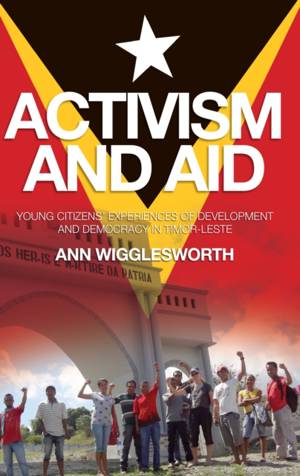
- Afhalen na 1 uur in een winkel met voorraad
- Gratis thuislevering in België vanaf € 30
- Ruim aanbod met 7 miljoen producten
- Afhalen na 1 uur in een winkel met voorraad
- Gratis thuislevering in België vanaf € 30
- Ruim aanbod met 7 miljoen producten
Zoeken
Activism and Aid
Young Citizens' Experiences of Development and Democracy in Timor-Leste
Ann Wigglesworth
€ 37,95
+ 75 punten
Omschrijving
Timor-Leste's independence was forged at a time when international developmental theory had rejected top down approaches and recognized the importance of participatory approaches in developmental strategies. In 1999, with the arrival of the United Nations and a multitude of bilateral, multilateral, and non-governmental organizations in Timor-Leste, it was hoped that the international intervention would at last produce a development success story. Independence also brought the realization that dreams for an independent Timor-Leste varied, often according to their generation. Three generations of Timorese - the political elite, a younger generation of independence activists (gerasaun foun), and today's youth of independent Timor-Leste - each bring their own experiences and face different challenges in Timor-Leste. Today, stark contrasts between the values of customary life and those of the modernizing world place both community leaders and young Timorese at a crossroads. The experiences of the Timorese are unique, and this book reflects a broader analysis about how an aid-influenced process of development can work in greater harmony with the people to realize their own visions of the future of the nation. *** "An immensely readable and insightful glimpse into the experiences, concerns and aspirations of Timor-Leste's youth, charting their course from student activists to nation builders, from the fight for national liberation to the battle for participation in governance structures and aid and development programs. I strongly recommend this book to anyone wanting a snapshot of the principal challenges facing Timor-Leste today in its quest to build a strong, stable and equitable nation...for all citizens, young and old." -- Kirsty Sword Gusm���£o, Chair, Alola Foundation & Goodwill Ambassador for Education of the Democratic Republic of Timor-Leste *** "Exceptionally well written, organized and presented...impressively informative, thoughtful, and thought provoking. Enhanced with the inclusion of a list of acronyms, a glossary, maps of Timor-Leste, and a list of references, 'Activism and Aid' is very highly recommended..." -- Midwest Book Review, MBR Bookwatch: June 2016, Helen's Bookshelf *** Librarians: ebook available on ProQuest and EBSCO (Series: Monash Asia) [Subject: Asian Studies, Development Studies, History, Politics]
Specificaties
Betrokkenen
- Auteur(s):
- Uitgeverij:
Inhoud
- Aantal bladzijden:
- 160
- Taal:
- Engels
- Reeks:
Eigenschappen
- Productcode (EAN):
- 9780980510874
- Verschijningsdatum:
- 21/03/2016
- Uitvoering:
- Paperback
- Formaat:
- Trade paperback (VS)
- Afmetingen:
- 152 mm x 231 mm
- Gewicht:
- 272 g

Alleen bij Standaard Boekhandel
+ 75 punten op je klantenkaart van Standaard Boekhandel
Beoordelingen
We publiceren alleen reviews die voldoen aan de voorwaarden voor reviews. Bekijk onze voorwaarden voor reviews.












